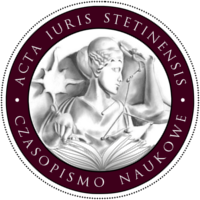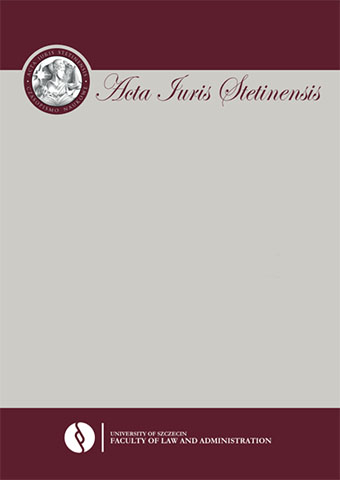| 1. | Bułajewski, S., Zasady prawidłowej legislacji podczas tworzenia aktów prawa miejscowego w Polsce, “Studia Prawnoustrojowe” 2015, No. 29. |
| 2. | Garlicki, L., Polskie prawo konstytucyjne. Zarys wykładu, Warszawa 2009. |
| 3. | Garlicki, L., Przesłanki ograniczania konstytucyjnych praw i wolności (na tle orzecznictwa Trybunału Konstytucyjnego), “Państwo i Prawo” 2001, vol. 10. |
| 4. | Grochowski, J., Milicyjne przeszukanie pozaprocesowe a konstytucyjne prawa osobiste w PRL, “Problemy Prawa Karnego” 1989, No. 15. |
| 5. | Kamińska-Nawrot, A., Kontrola osobista - racjonalnosc ustawodawcy, “Studia nad Bez-pieczeństwem” 2017, No. 2. |
| 6. | Kamińska-Nawrot, A., Przeszukanie osoby a kontrola osobista - w kontekscie zasady in¬formacji prawnej, “Security, Economy & Law” 2017, No. 4. |
| 7. | Karaźniewicz, J., Przeszukanie i czynności zbliżone do przeszukania w teorii i praktyce or¬ganów ścigania, in: Hofmański, P. (ed.), Węzłowe problemy procesu karnego. Materiały konferencyjne - Kraków, 25-28.9.2008, Warszawa 2010. |
| 8. | Kaznowski, A., Karnoprocesowe aspekty przeszukania osoby w polskiej procedurze karnej, “Wojskowy Przegląd Prawniczy” 2008, No. 3. |
| 9. | Koksanowicz, G., Zasada określoności przepisów w procesie stanowienia prawa, “Studia Iuridica Lublinensia” 2014, No. 22. |
| 10. | Łabno, A., Istota zasady proporcjonalności, in: Dukiet-Nagórska, T. (ed.), Zasada proporcjonalności w prawie karnym, Warszawa 2010. |
| 11. | Pieprzny, S., Policja - organizacja i funkcjonowanie, Kraków 2011. |
| 12. | Skorupka, J., Konstytucyjne i konwencyjne granice przeszukania w postępowaniu karnym (cz.l), “Palestra” 2007, No. 9-10. |
| 13. | Starzyński, P., Skutki uznania niekonstytucyjności art. 236 § 2 k.p.k., “Przegląd Policyjny” 2010, No. 3. |
| 14. | Szumiło-Kulczycka, D., Kontrola osobista, przeglądanie zawartości bagaży, przeszukanie (przyczynek do kwestii racjonalności legislacji), “Państwo i Prawo” 2012, No. 3. |
| 15. | Tuleja, P. (ed.), Konstytucja Rzeczypospolitej Polskiej. Komentarz, Warszawa 2019. |
| 16. | Wiliński, P., Proces karny w świetle konstytucji, Warszawa 2011. |
| 17. | Wójtowicz, K., Zasada proporcjonalności jako wyznacznik konstytucyjności norm, in: Zu- bik, M. (ed.), Księga XX-lecia orzecznictwa Trybunału Konstytucyjnego, Warszawa 2006. |
| 18. | Zalasiński, T., Zasada prawidłowej legislacji w poglądach Trybunału Konstytucyjnego, Warszawa 2008 |







